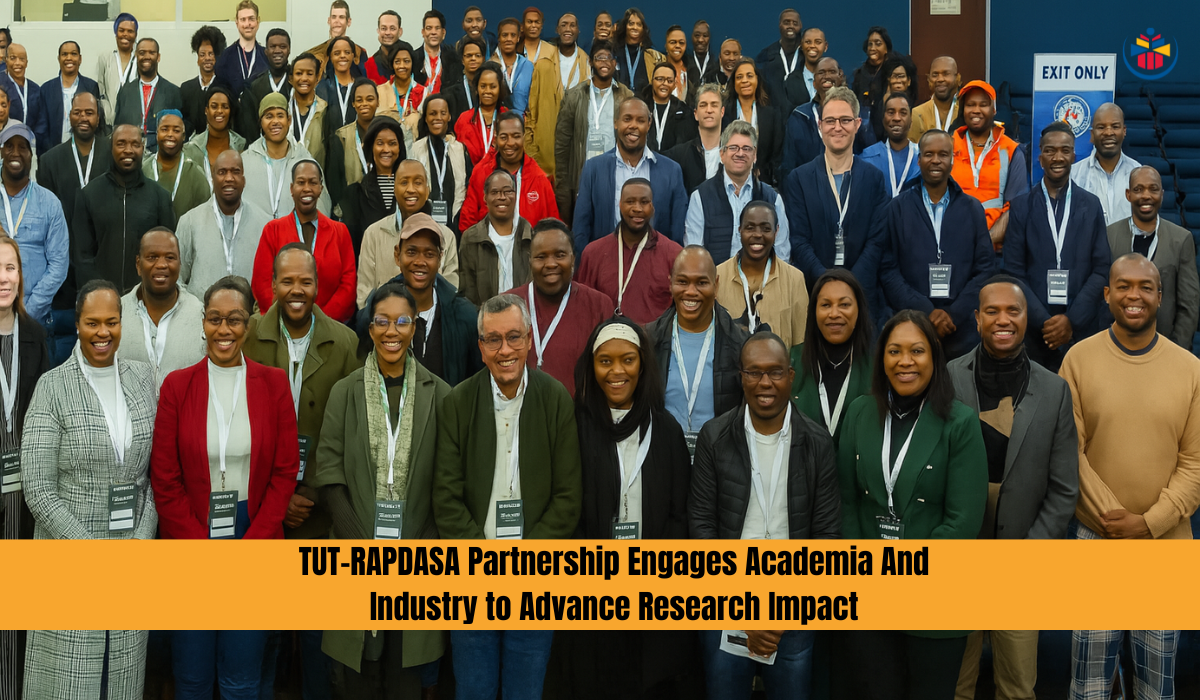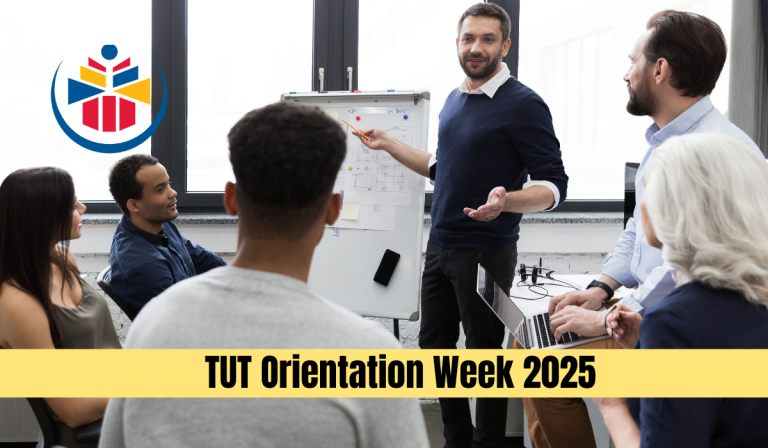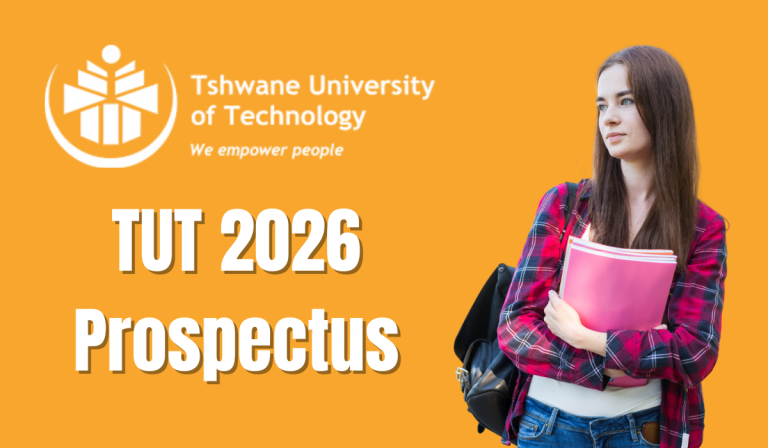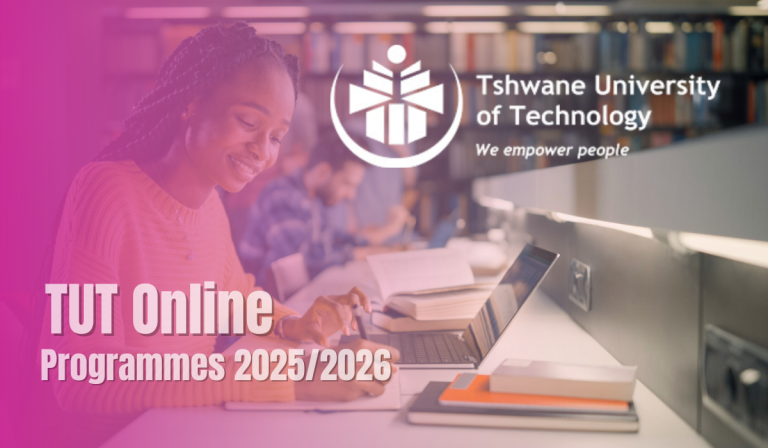TUT-RAPDASA Partnership Engages Academia And Industry to Advance Research Impact

TUT-RAPDASA Partnership Engages Academia And Industry to Advance Research Impact. The TUT-RAPDASA partnership is proving to be a catalyst in reshaping the future of South Africa’s manufacturing and research landscape. Through this collaboration, the Tshwane University of Technology (TUT) and the Rapid Product Development Association of South Africa (RAPDASA) aim to close the persistent gap between academia and industry, unlocking pathways for innovation, job creation, and sustainable growth.
Driving Collaboration: The Industry Day Initiative
On 26 June 2025, the Pretoria Campus of TUT became a hub of knowledge exchange and strategic dialogue as it hosted an Industry Day in partnership with RAPDASA. The event brought together industry leaders, academic researchers, innovators, and students, all united by a shared mission: to transform South Africa’s manufacturing sector by aligning academic research with real-world industrial needs.
Dr Vathiswa Papu-Zamxaka, Deputy Vice-Chancellor for Research, Innovation and Engagement at TUT, set the tone with her opening address. She underscored the importance of embedding global frameworks like the Fourth Industrial Revolution (4IR) and the United Nations Sustainable Development Goals (SDGs) into the university’s research priorities.
“These themes are not merely academic concepts,” she explained, “but are essential for fostering inclusive, sustainable, and resilient societies. The TUT-RAPDASA partnership and the Industry Day serve as crucial platforms to advance this agenda.”
Why Such Partnerships Are Vital
Universities are no longer just centres of learning; they are drivers of economic development and social change. Dr Papu-Zamxaka highlighted this by stressing the university’s obligation to work closely with industry.
| Key Objectives of the TUT-RAPDASA Collaboration | Details |
|---|---|
| Align research with industry challenges | Focusing on problems defined jointly with industry for maximum relevance |
| Foster inclusive industrial transformation | Promoting equitable growth through Additive Manufacturing (AM) and other advanced technologies |
| Develop globally competitive graduates | Equipping students with future-focused, industry-relevant skills |
| Drive sustainable innovation | Linking 4IR and SDG principles to real-world manufacturing solutions |
By hosting events like the Industry Day, TUT and RAPDASA are nurturing partnerships that not only inspire dialogue but also showcase innovative student projects, paving the way for meaningful industrial collaborations.
The State of Additive Manufacturing in South Africa
David Bullock, Managing Director of Rapid 3D at RAPDASA, delivered an insightful keynote, offering a panoramic view of Africa’s evolving manufacturing ecosystem. He focused heavily on Additive Manufacturing (AM), commonly known as 3D printing, and its transformative potential.
“Additive Manufacturing has been part of South Africa’s industrial toolkit for over two decades,” Bullock noted. “Our mission at RAPDASA is to keep demonstrating the relevance of AM in driving inclusive industrial transformation.”
He elaborated on how RAPDASA has been instrumental in raising awareness about AM’s capabilities to solve pressing societal and industrial challenges, reinforcing the association’s commitment to innovation.
Building Stronger Academia-Industry Synergy
The discussions at the event made it clear that while progress has been made, significant work remains. Dr Hamilton Mphidi, Director of the Technology Transfer Office at the University of Johannesburg, delivered a compelling address on the need for tighter strategic alignment.
“There remains a significant disconnect between academia and industry in South Africa,” he stated. To remedy this, Dr Mphidi proposed a three-pillar approach:
- Strategic Partnerships: Encouraging collaborations that extend beyond SMMEs to include large industry players for broader societal impact.
- Targeted Funding: Directing financial resources to research areas with clear industrial relevance.
- Practical Applications: Ensuring research outcomes can be implemented effectively to address real-world problems.
Dr Mphidi strongly advocated for universities to involve industry stakeholders right from the problem-definition stage of research projects. “When we start by defining problems together with industry, we can co-create solutions that are truly impactful,” he said. This approach also facilitates smoother processes for publishing, licensing, and commercialising university-developed intellectual property.
Removing Institutional Barriers to Innovation
The formal proceedings concluded with remarks from Prof Thomas Olwal, Acting Assistant Dean for Postgraduate Studies, Research and Innovation at TUT’s Faculty of Engineering and the Built Environment (FEBE). He stressed that institutional bottlenecks often stand in the way of agile collaboration.
“As we plan future RAPDASA Industry Days, we must reflect on past progress while actively dismantling bureaucratic barriers that stall innovation,” Prof Olwal urged. He highlighted the urgency of co-identifying relevant challenges with industry and then moving through a cycle of co-creation, co-manufacture, and co-commercialisation.
The Broader Vision: Sustainable Economic Growth
At its core, the TUT-RAPDASA partnership is about more than just academic papers or technological showcases. It represents a shift towards building a robust national innovation system that can deliver sustainable economic growth, create employment opportunities, and ensure South Africa remains competitive in the global marketplace.
By integrating 4IR technologies and aligning with SDGs, such partnerships are setting the groundwork for a more inclusive and future-ready industrial ecosystem. This is particularly important in a country grappling with high youth unemployment and significant economic disparities.
Engaging Students and the Next Generation of Innovators
One of the standout aspects of the Industry Day was the involvement of students. Through project exhibitions and interactive sessions with industry experts, students gained first-hand exposure to how their academic pursuits could directly impact industrial processes and societal challenges.
This engagement is crucial for developing future-focused graduates who are not only employable but also capable of driving innovation from within the workforce.
FAQs About TUT-RAPDASA Partnership
The primary aim is to bridge the gap between academic research and industrial needs. By doing so, the partnership helps produce impactful research that solves real-world problems, fosters innovation, and supports South Africa’s drive towards inclusive industrial transformation.
Additive Manufacturing (AM), or 3D printing, enables cost-effective, rapid prototyping and production of complex parts. In South Africa, it is being used to advance sectors such as aerospace, automotive, and healthcare, helping local industries stay competitive and fostering new economic opportunities.
When universities and industries collaborate from the outset, research outputs become highly relevant and easier to commercialise. This approach accelerates problem-solving, ensures funding is well-directed, and leads to innovations that directly benefit society and the economy.
Conclusion
The TUT-RAPDASA partnership serves as an exemplary model of how academia and industry can join forces to drive meaningful change. Through events like the Industry Day and ongoing collaborations, they are cultivating a fertile environment for innovation, skill development, and economic progress. By embedding global frameworks like 4IR and SDGs into their mission, they’re also ensuring that South Africa’s industrial future is not just competitive but inclusive and sustainable.







